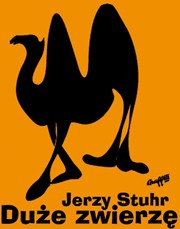The era of Communism in Europe gave the world a steady stream of films that attracted international attention. Censorship honed the expressive skills of directors, and the region's film-makers were consistently able to outwit the censors and comment on the regime. With the fall of Communism, we are left with the worrying question of what these films are worth if the ideology that they chose to critique is now gone. Did Western critics give Brownie points to films for their pokes against the system too readily, rather than evaluating their aesthetic merits?
Proponents of Central European cinema from the Communist era argue that these political films made more general points about power, its abuse and how evil propagates through society. As such, these films still have both political and aesthetic merit even in a Europe freed of Communism.
If this were true, a sceptic might argue, Central Europeans would still make political films in this subtle style, with stabs at the Communist regime being metaphors for wider concerns. But they do! Or, at least, Polish director Jerzy Stuhr does in his fourth and latest film, Duże zwierzę (The Big Animal, 2000), based on an early, previously unshot screenplay by the late Polish master-director Krzysztof Kieślowski.
Becoming strange
When a passing circus decides to abandon one of its camels, childless couple Mr and Mrs Sawicki (the husband played by Stuhr, who stars in all his own films) take to the animal and 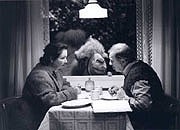 decide to adopt it. Everyone assumes that Sawicki, who has up to now led an unremarkable and quiet existence as an office clerk, has found himself a goldmine and will use it for all it is worth. However, attracted by the animal's noble qualities, the aging couple develop a deep and sincere love for the creature and are horrified by those who want to exploit it for commercial gain.
decide to adopt it. Everyone assumes that Sawicki, who has up to now led an unremarkable and quiet existence as an office clerk, has found himself a goldmine and will use it for all it is worth. However, attracted by the animal's noble qualities, the aging couple develop a deep and sincere love for the creature and are horrified by those who want to exploit it for commercial gain.
As well as having to fend off those who want to make money from the animal, the Sawickis have to contend with the municipality. First there is the puzzle of how to register the animal, seeing that "camel" is not an available option on any of the forms. The local Party wants the camel as a donation to the raffle, and when the couple refuse, they are harrassed on trivial, trumped-up charges: 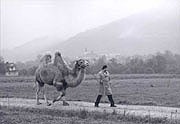 the camel is a health risk as it fouls the pavement and is distracting the local school children from their work.
the camel is a health risk as it fouls the pavement and is distracting the local school children from their work.
All this leads to Sawicki becoming an isolated and misunderstood man, demonised for the sympathy and compassion he shows in the autumn years of his life. The respect he once held in the community completely evaporates. Even the school children fail to understand the creature as Sawicki does, seeing it as an object of cuteness and fun rather than as a majestic creature who deserves awe and respect.
A career of homage
Stuhr has had an illustrious career in film acting, having appeared in many of Krzysztof Kieślowski's films. It was with Kieślowski's help that Stuhr broke into film directing, with the older director collaborating with Stuhr on the screenplays for his first two directorial efforts, Spis cudzołożnic (The List of Adulterers, 1994) and Historie miłosne (Love Stories, 1997). With his third film, Tydzień z życia mężczyzny (A Week in the Life of a Man, 1999), Stuhr wrote the screenplay on his own, but still stuck to a markedly Kieślowskian moral tale.
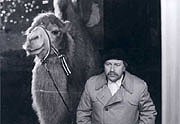 Duże zwierzę is, perhaps, the most convincing of Stuhr's films so far. Stuhr is a genius of an actor, an increasingly competent director, but only a mediocre script-writer. Consequently, Stuhr's decision to distance himself from the writing process and concentrate on what he does best has to be applauded.
Duże zwierzę is, perhaps, the most convincing of Stuhr's films so far. Stuhr is a genius of an actor, an increasingly competent director, but only a mediocre script-writer. Consequently, Stuhr's decision to distance himself from the writing process and concentrate on what he does best has to be applauded.
However, the question still remains if Stuhr is going to become anything more than an interesting footnote to Kieślowski's career. Whilst he is acutely sensitive to acting and has a stong awareness of human morality and weakness, Stuhr has yet to show signs of being an original thinker, either cinematically or philosophically.
As such, Duże zwierzę is Kieślowski's film as much as it is Stuhr's. Stuhr, however, is a sensitive adapter, and his skill at realizing Kieślowski's screenplay is marked by the low-key approach he takes—a far cry from Kieślowski's own tired, overly self-conscious last works in which, to the chagrin of Poles, he moved attention away from ordinary people to stunningly good-looking supermodels, fabulously wealthy celebrity composers and unfeasibly successful businessmen.
Bringing it up to date
Stuhr also ably handles the film's social and political components in light of the massive changes that have occurred between the writing of the script and its shooting. Sawicki's downfall clearly takes place against the backdrop of a totalitarian mentality.
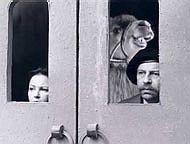 Although set in Communist times, Stuhr downplays anything that might pin the action down too closely to one historical period or even to one particular political regime, turning the film into an slightly absurdist drama having much the same aims as the plays of Eugène Ionesco, although a more restrained language. Totalitarianism in this respect becomes a symbol for the qualities that lead to totalitarianism—conformity, fear, opportunism.
Although set in Communist times, Stuhr downplays anything that might pin the action down too closely to one historical period or even to one particular political regime, turning the film into an slightly absurdist drama having much the same aims as the plays of Eugène Ionesco, although a more restrained language. Totalitarianism in this respect becomes a symbol for the qualities that lead to totalitarianism—conformity, fear, opportunism.

|
Communist-era scripts clearly are just as relevant as ever before.
Andrew James Horton, 22 January 2001
Duże zwierzę showed at the 44th London Film Festival
Also of interest:
- What a Piece of Work is a Man!
Jerzy Stuhr's Tydzień z życia mężczyzny reviewed - "I made a film about weakness"
Jerzy Stuhr talking about Tydzień z życia mężczyzny - Better to Have Loved and Lost...
Jerzy Stuhr's Historie miłosne reviewed
Moving on:
- The Kinoeye Archive of articles on Central European film
- Browse through the CER eBookstore for electronic books
- Buy English-language books on Central European cinema through CER
- Return to CER front page



